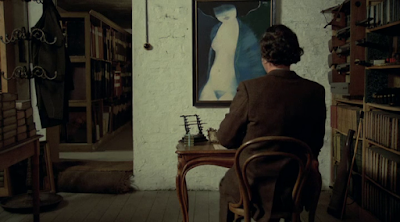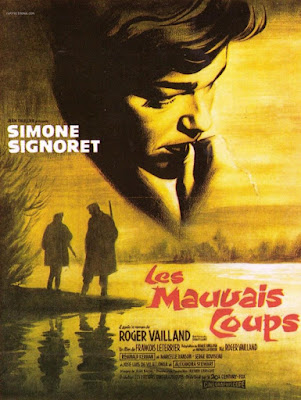[About halfway through John Banville’s novel, The Book of Evidence, the narrator, Freddie Montgomery steals a painting from Whitewater, an Irish manor house. Before he does, however, he invents the scene of the painting’s creation.]
The painting is called, as everyone must know by now, Portrait of a Woman with Gloves. It measures eighty-two centimetres by sixty-five. From internal evidence – in particular the woman’s attire – it has been dated between 1655 and 1660. The black dress and broad white collar and cuffs of the woman are lightened only by a brooch and gold ornamentation on the gloves. The face has a slightly Eastern cast. (I am quoting from the guidebook to Whitewater House.) The picture has been variously attributed to Rembrandt and Frans Hals, even to Vermeer. However, it is safest to regard it as the work of an anonymous master.
None of this means anything.
I have stood in front of other, perhaps greater paintings, and not been moved as I am moved by this one. I have a reproduction of it on the wall above my table here – sent to me by, of all people, Anna Behrens – when I look at it my heart contracts. There is something in the way the woman regards me, the querulous, mute insistence of her eyes, which I can neither escape nor assuage. I squirm in the grasp of her gaze. She requires of me some great effort, some tremendous feat of scrutiny and attention, of which I do not think I am capable. It is as if she were asking me to let her live.
She. There is no she, of course. There is only an organisation of shapes and colours. Yet I try to make up a life for her. She is, I will say, thirty-five, thirty-six, though people without thinking still speak of her as a girl. She lives with her father, the merchant (tobacco, spices, and, in secret, slaves). She keeps house for him since her mother’s death. She did not like her mother. Her father dotes on her, his only child. She is, he proclaims, his treasure. She devises menus – father has a delicate stomach – inspects the kitchen, she even supervises his wine cellar. She keeps an inventory of the household linen in a little notebook attached to her belt by a fine gold chain, using a code of her own devising, for she has never learned to read or write. She is strict with the servants, and will permit no familiarities. Their dislike she takes for respect. The house is not enough to absorb her energies, she does good works besides: she visits the sick, and is on the board of visitors of the town’s almshouse. She is brisk, sometimes impatient, and there are mutterings against her among the alms-folk, especially the old women. At times, usually in spring and at the beginning of winter, everything becomes too much for her. Notice the clammy pallor of her skin: she is prey to obscure ailments. She takes to her bed and lies for days without speaking, hardly breathing, while outside in the silvery northern light the world goes about its busy way. She tries to pray, but God is distant. Her father comes to visit her at evening, walking on tiptoe. These periods of prostration frighten him, he remembers his wife dying, her terrible silence in the last weeks. If he were to lose his daughter too – But she gets up, wills herself to it, and very soon the servants are feeling the edge of her tongue again, and he cannot contain his relief, it comes out in little laughs, roguish endearments, a kind of clumsy skittishness. She considers him wryly, then turns back to her tasks. She cannot understand this notion he has got into his head: he wants to have her portrait painted. I’m old, is all he will say to her, I am an old man, look at me! And he laughs, awkwardly, and avoids her eye. My portrait? she says, mine? – I am no fit subject for a painter. He shrugs, at which she is first startled, then grimly amused: he might at least have attempted to contradict her. He seems to realise what is going through her mind, and tries to mend matters, but he becomes flustered, and, watching him fuss and fret and pluck at his cuffs, she realises with a pang that it’s true, he has aged. Her father, an old man. The thought has a touch of bleak comedy, which she cannot account for. You have fine hands, he says, growing testy, annoyed both at himself and her, your mother’s hands – we’ll tell him to make the hands prominent. And so, to humour him, but also because she is secretly curious, she goes along one morning to the studio. The squalor is what strikes her first of all. Dirt and daubs of paint everywhere, gnawed chicken bones on a smeared plate, a chamber-pot on the floor in the corner. The painter matches the place, with that filthy smock, and those fingernails. He has a drinker’s squashed and pitted nose. She thinks the general smell is bad until she catches a whiff of his breath. She discovers that she is relieved: she had expected someone young, dissolute, threatening, not this pot-bellied old soak. But then he fixes his little wet eyes on her, briefly, with a kind of impersonal intensity, and she flinches, as if caught in a burst of strong light. No one has ever looked at her like this before. So this is what it is to be known! It is almost indecent. First he puts her standing by the window, but it does not suit the light is wrong, he says. He shifts her about, grasping her by the upper arms and walking her backwards from one place to another. She feels she should be indignant, but the usual responses do not seem to function here. He is shorter than her by a head. He makes some sketches, scribbles a colour note or two, then tells her to come tomorrow at the same time. And wear a darker dress, he says. Well! She is about to give him a piece of her mind, but already he has turned aside to another task. Her maid, sitting by the door, is biting her lips and smirking. She lets the next day pass, and the next, just to show him. When she does return he says nothing about the broken appointment, only looks at her black dress – pure silk, with a broad collar of Spanish lace – and nods carelessly, and she is so vexed at him it surprises her, and she is shocked at herself. He has her stand before the couch. Remove your gloves, he says, I am to emphasise the hands. She hears the note of amused disdain in his voice. She refuses. (Her hands, indeed!) He insists. They engage in a brief, stiff little squabble, batting icy politenesses back and forth between them. In the end she consents to remove one glove, then promptly tries to hide the hand she has bared. He sighs, shrugs, but has to suppress a grin, as she notices. Rain streams down the windows, shreds of smoke fly over the rooftops. The sky has a huge silver hole in it. At first she is restless, standing there, then she seems to pass silently through some barrier, and a dreamy calm comes over her. It is the same, day after day, first there is agitation, then the breakthrough, then silence and a kind of softness, as if she were floating away away, out of herself. He mutters under his breath as he works. He is choleric, he swears, and clicks his tongue, sending up sighs and groans. There are long, fevered passages when he works close up against the canvas, and she can only see his stumpy legs and his old, misshapen boots. Even his feet seem busy. She wants to laugh when he pops his head out at the side of the easel and peers at her sharply, his potato nose twitching. He will not let her see what he is doing, she is not allowed even a peek. Then one day she senses a kind of soundless, settling crash at his end of the room, and he steps back with an expression of weary disgust and waves a hand dismissively at the canvas, and turns aside to clean his brush. She comes forward and looks. For a second she sees nothing, so taken is she by the mere sensation of stopping like this and turning: it is as if – as if somehow she had walked out of herself. A long moment passes. The brooch, she says, is wonderfully done. The sound of her own voice startles her, it is a stranger speaking, and she is cowed. He laughs, not bitterly, but with real amusement and, so she feels, a curious sort of sympathy. It is an acknowledgement, of – she does not know what. She looks and looks. She had expected it would be like looking in a mirror, but this is someone she does not recognise, and yet knows. The words come unbidden into her head: Now I know how to die. She puts on her glove, and signals to her maid. The painter is speaking behind her, something about her father, and money, of course, but she is not listening. She is calm. She is happy. She feels numbed, hollowed, a walking shell. She goes down the stairs, along the dingy hall, and steps out into a commonplace world.
Do not be fooled: none of this means anything either.






